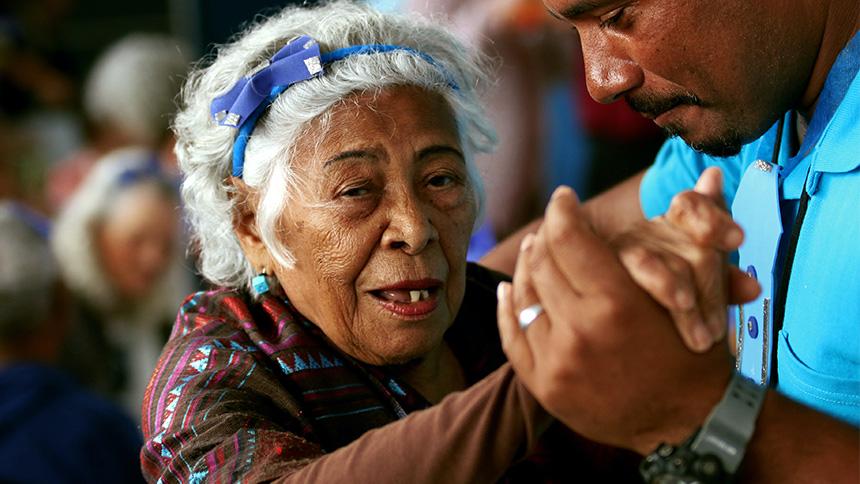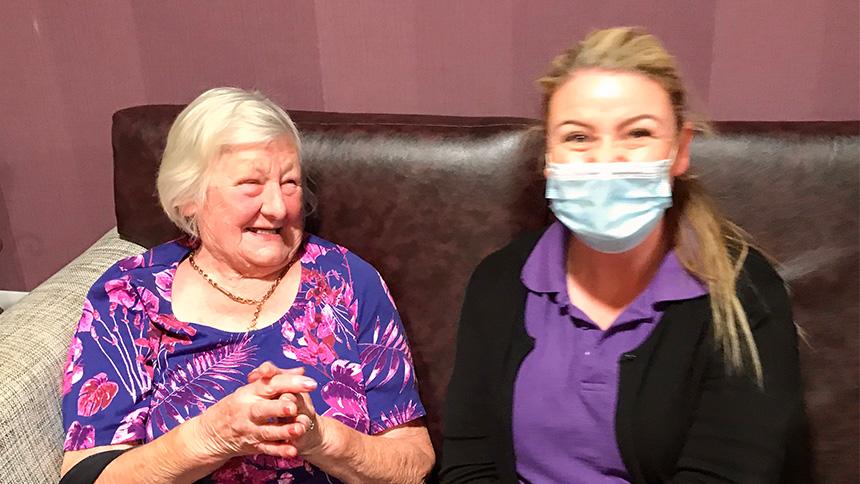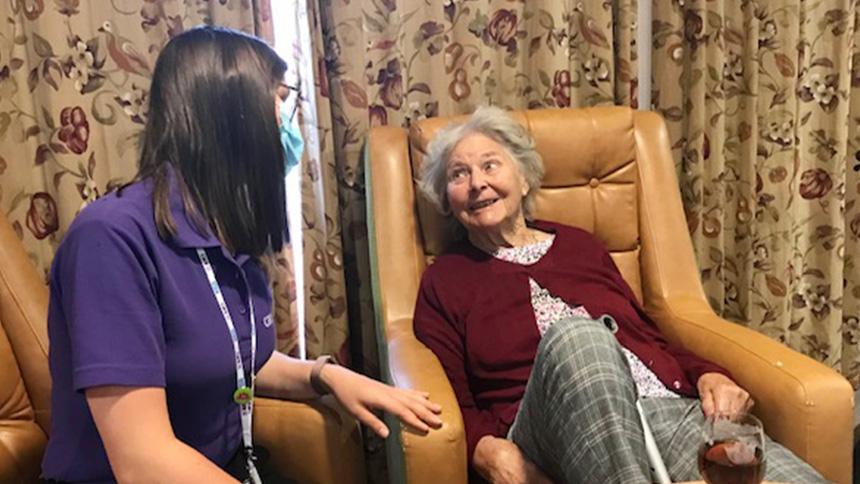Singing our own songs: Helping people run their own Singing for the Brain sessions
More people affected by dementia are enjoying Singing for the Brain as new groups flourish.
Alzheimer’s Society developed Singing for the Brain to bring people with dementia, carers and relatives together in a stimulating, fun, friendly and safe environment.
It can improve brain activity, wellbeing and mood, even during coronavirus as our virtual service reaches thousands of people by video call or phone.
‘Music plays a key role in our identity and culture. It has an amazing effect on the mind,’ says Sophie Tucker, our Product Development Officer.
‘Whether it’s listening, singing or moving to the rhythm, each session creates powerful connections between people.’
We’re working with partners across the country so they can run Singing for the Brain with more people in all kinds of settings.

Photograph: Vladimir Soares.
Included and enabled
There aren’t enough Singing for the Brain groups for everyone who wants to enjoy them. There’s also a massive disparity in where they’re run, with none at all in some areas.
To change this, we’re training individuals and organisations to deliver Singing for the Brain themselves.
Currently online due to the pandemic, our training and resources cover planning, promoting and delivering a session, the impact of music on people affected by dementia, and safeguarding.
We also provide ongoing support after training, with feedback to help maintain high standards.
‘The service must meet the needs of people affected by dementia,’ says Ann Likeman, a former Singing for the Brain Leader who’s now a Training and Support Volunteer.
‘Everyone who attends a session should be included, respected and enabled to participate and freely express themselves through music and singing.’
Fantastic preparation
Tiffany Thompson, Lifestyle Lead at Perry Manor in Worcester, recently completed Singing for the Brain training with her colleague Deb Milosavljevich, the care home’s Lifestyle Co-ordinator.
‘Before the pandemic, we were taking some of our residents out to fantastic Singing for the Brain sessions in the community. But they can’t all get to those, so we jumped at the chance to do the training,’ she says. ‘It means we can widen the range of residents involved, including those at different stages of dementia.’

Tiffany was very impressed with the training, which was held with Sophie and Ann.
‘It was fantastic – there were good ideas and good practice,’ she says. ‘It was very interactive and we could trial things out.
‘Sophie was lovely and so bubbly. She’s answered all my questions any time I’ve phoned up!’
It was just the preparation Tiffany and Deb needed to deliver their own sessions. They chose to use PowerPoint or YouTube, with lyrics on a big screen.
‘The residents have really enjoyed it,’ says Tiffany. ‘Even people who I wouldn’t have thought would want to join in.
‘Even if they can’t get fully involved, some residents will tap along or nod their head. And for those whose mobility isn’t as good, we can adapt it as a one-to-one session in their room.’
Singing for the Brain has been especially meaningful for some residents.
‘One lady heard her wedding song, which reminded her of dancing with her husband,’ says Tiffany. ‘She said it was a memory that she hadn’t had for years.’
Pat, a resident at Perry Manor, says, ‘I like to come to these groups – it’s fun and it doesn’t matter if you can sing or not.’
‘The group took me back to my younger years and lifted my spirits,’ adds Greta, another resident.

Accessible to all
We’re keen to train more care home staff who can deliver face-to-face Singing for the Brain sessions for their residents.
We’re also looking for individuals who could run virtual sessions within the community, including for younger people with dementia and people from Black, Asian and other Minority Ethnic communities.
This work has been boosted by a £28,000 donation from the Utley Foundation, a charitable trust, which will enable 80 Singing for the Brain groups to be set up by partners across the UK.
The foundation supports Music for Dementia, a national campaign to make music freely available to everyone living with dementia, which recently launched m4d Radio, a free online radio station.
‘We want to make Singing for the Brain accessible to everyone with dementia, no matter where they live, what stage of dementia they’re at or what music tastes they have,’ says Sophie.
We need your help
You can help us make sure that Singing for the Brain is available to anyone living with dementia.


Dee Phesse
sayskatrina langford
saysHi, I would like to know where i could get training for to be able to run sessions like you do.
Hi Katrina, thanks for getting in touch.
If you are interested in delivering your own Singing for the Brain group, and you're based in England, Wales or Northern Ireland, Alzheimer's Society would be delighted to provide you with the support and resources you need. Fill out your details here: https://www.alzheimers.org.uk/singing-brain-delivery-partner
If you're interested in other training opportunities, take a look at what we have available (https://www.alzheimers.org.uk/dementia-professionals/external-training) or contact a member of our training team through the enquiry form (https://www.alzheimers.org.uk/dementia-professionals/external-training/…).
We hope this helps.
Alzheimer's Society website team
Kim
saysHello, i have found in our area Gloucester, singing for the brain due to Altziemers, can be so difficult to log on too. Forgetfulness, etc: is there a simplier way it can be done? Sometimes i never get into the club.
Hi Kim, thanks for getting in touch.
We would recommend contacting your local office about this - they may be able to provide support, such as suggesting alternative ways to take part, or reminders to join ahead of time.
You can also contact our Customer Care team for further information on 0330 333 0804.
We hope this helps for now.
Alzheimer's Society digital team
David Richman
saysMy wife aged 90 suffers from Altzeimer. I would like her to hear the songs and music she knows on our Television. Please advise. Thanks
Hello David, thanks for your comment.
Listening to familiar music with your wife sounds like a great idea. Depending on what kind of television or music players you have, there are a few different ways you could do this. You might be able to access BBC iPlayer or radio stations, for example.
We have some general advice on different ways to enjoy music, here: https://www.alzheimers.org.uk/dementia-together-magazine/dec-jan-2018-2…
And if you are interested in Singing for the Brain, we've been running sessions by phone and online. Read more information about it here: https://www.alzheimers.org.uk/get-support/your-support-services/singing…
I hope this is helpful. If you need more advice or support, please do call our Dementia connect support line on 0333 150 3456. One of our trained dementia advisers can provide more ideas and support.
Thanks,
Alzheimer's Society blog team
Christina Sweeney
saysI have just done a singing at home session with my Grandma and I thought it was so useful. Her and my Grandad get so much from these sessions. It keeps their brains active when life gets so boring. They have always loved singing and it really helps them to touch on a part of their 'old life'.
Mrs White
saysI always sing to my husband, and recorded a song with,my husband, s name, and where he came to England from. , plus 4 other songs for our wedding anniversary 3 years ago. Please put the personalised name of the person youlove. It becomes their song.